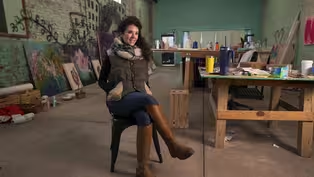
Tragedy at Follinglo
Clip: Season 1 Episode 112 | 9m 48sVideo has Closed Captions
A National Guard airplane crashed into the Tjernagel family farmhouse on December 9, 1968.
A National Guard airplane crashed into the Tjernagel family farmhouse near Story City on December 9, 1968. As they recall the incident, three Tjernagel siblings share their gratitude for the community’s response and honor the memory of the guardsmen who were killed.
Problems playing video? | Closed Captioning Feedback
Problems playing video? | Closed Captioning Feedback
Iowa Life is a local public television program presented by Iowa PBS

Tragedy at Follinglo
Clip: Season 1 Episode 112 | 9m 48sVideo has Closed Captions
A National Guard airplane crashed into the Tjernagel family farmhouse near Story City on December 9, 1968. As they recall the incident, three Tjernagel siblings share their gratitude for the community’s response and honor the memory of the guardsmen who were killed.
Problems playing video? | Closed Captioning Feedback
How to Watch Iowa Life
Iowa Life is available to stream on pbs.org and the free PBS App, available on iPhone, Apple TV, Android TV, Android smartphones, Amazon Fire TV, Amazon Fire Tablet, Roku, Samsung Smart TV, and Vizio.
Providing Support for PBS.org
Learn Moreabout PBS online sponsorship♪♪ The Tjernagel family's story of survival begins in the 1850s when they emigrated from Norway and settled here on a place they called Follinglo Farm.
Over the decades, they built a life here, raising short-horn cattle, crops and generations of children.
On December 9, 1968, Peter and Marie Tjernagel and their family were just about to enjoy their evening meal, when tragedy struck.
♪♪ Sigrid Tjernagel Hanson: Mom had just come out from the bathroom into the kitchen and Mike was getting dad up.
Mike Tjernagel: Dad had rheumatoid arthritis and so I was getting him ready.
It sounded like a jet and I think I mentioned to him, boy that one is low.
Ingeborg Tjernagel Schey: Just this incredibly loud sound.
We had sonic booms over the farm, so we were kind of familiar with that.
But this just wouldn't stop, it wouldn't stop, it just kept getting louder and louder and then kaboom!
(explosion) Sigrid Tjernagel Hanson: Then I went over the table, landed at mom's feet and when I got up that whole wall was gone.
There wasn't a stove, an oven, anything.
And then the upstairs came down.
So, we started running.
♪♪ The explosion sent burning wreckage onto the farmhouse engulfing it in flames.
Miraculously, all seven family members who were home that night escaped.
♪♪ Sigrid Tjernagel Hanson: I kept turning around because I just couldn't believe, I just couldn't believe it, and it just kept getting bigger and bigger and bigger and we were driving away from it, so it should have been getting smaller.
And it just blew my mind until we were on the way to Story City, I was convinced that it was the oven the blew up.
And Mary Ellen said, she just reached over and said, no, it was an airplane.
♪♪ 25 minutes earlier, an Iowa Air National Guard F-89 Scorpion left Des Moines.
The pilot was Captain John Rooks of Eldora and the radar operator was Lieutenant Larry Thomas of Ogden.
They were on a training mission with three other Iowa Air Guard planes.
Terry Greenfield: I worked in personnel full-time.
I saw the two guys.
They'd always come in together.
Night flying usually started around five or six o'clock and lasted for about 90 minutes.
The F-89J Scorpion, it was one of the first jets in the Air Force.
We called it the lead sled because it took the whole runway to get off the ground.
So, they were out doing a little bit of dogfighting type of thing.
The crew got kind of behind on the rest of the other two airplanes and the bigger plane they were protecting and they got kind of lost and they were up pretty high and they somehow became inverted.
And the yard lights looked like stars.
They didn't believe they were instruments.
They thought they could see where the sky was.
So, they were pulling back on the joystick to go higher, but they were actually going lower, and they were kicking in the afterburners to go faster to get more lift and they were actually going faster into the ground.
♪♪ Sigrid Tjernagel Hanson: I believe with all my heart that he tried to steer it as far from a populated area.
And I don't know if that's true or not.
Maybe he just couldn't do anything.
But in my mind, he did all that he humanly could.
Mike Tjernagel: And they basically should be heroes because they were training to defend this country.
♪♪ The loss was heavy for the pilot's families.
But somehow, the Tjernagel's escaped with only minor injuries.
♪♪ Ingeborg Tjernagel Schey: That was a big moment for all of us was like, yeah, it's all gone, everything.
Mike Tjernagel: That's a terrible thing when you finally realize the only thing you have is on your body and then not everything was mine.
Sigrid Tjernagel Hanson: By the next night, we were in a house, and that house had -- Mike Tjernagel: It was totally furnished.
Sigrid Tjernagel Hanson: -- beds.
Mike Tjernagel: Totally furnished.
Beds were made.
Everything -- the cupboards were full.
Sigrid Tjernagel Hanson: There were Kleenex boxes, there was toilet paper, there were toothbrushes, and this was before email and texting.
This is word of mouth.
Everybody did what they could, they came together.
Ingeborg Tjernagel Schey: And then the Christmas tree.
Sigrid Tjernagel Hanson: When we moved in that Tuesday night, there was this Christmas tree with the boxes of decorations underneath it so that we could decorate it.
They thought we would enjoy doing that.
Ingeborg Tjernagel Schey: That was so sweet, so thoughtful.
Sigrid Tjernagel Hanson: And that was very thoughtful.
♪♪ The support of the Story City community would fortify the Tjernagel family in the trying days to come.
Just a few weeks after the crash, Pete Tjernagel passed away, and the responsibility for rebuilding fell to Marie.
She would need to go to school, find a job, and begin what would turn into a four-year process of requesting compensation for the damages to their property, their farm equipment and the loss of the entire 1968 crop.
♪♪ Mike Tjernagel: The insurance company was willing to settle, but she was advised not to, let's see what the Air Force -- Ingeborg Tjernagel Schey: And then throughout all of this time, she has to list everything that was in the house that we lost, everything.
Sigrid Tjernagel Hanson: The purchase, when we purchased it, the purchase price, and the value.
State and federal government squabbled over who would take responsibility.
Marie Tjernagel: The frustration and the suspension and the, oh, you name it, it has been so hard not knowing.
You can't make plans.
You don't know if the money is coming.
You don't like to borrow because the interest rates are so high, when you don't have any idea when the money will be coming in.
Ingeborg Tjernagel Schey: So, she was kind of stuck between two great big bureaucracies and nobody was listening to her.
They were ignoring the plight of two families in Iowa.
Dean Borg: This is all that remains of the Clarence McCarville farm home east of Cresco.
An Air Force F-102 crashed into it this morning.
The incident at the Tjernagel farm was the second crash in Iowa that year.
Six months earlier, a Wisconsin Air National Guard plane went down near Cresco.
That pilot safely ejected.
But his plane destroyed the home of Clarence and Emma McCarville.
Years later, the McCarville's were still living in a chicken coop.
Numerous newspaper articles detailed the family's situation, drawing attention to the problem.
Senator Harold Hughes proposed legislation for the relief of the Tjernagel family.
The people of Story City came through again when a sociology class started a petition and collected 14,000 signatures.
And, when President Nixon came to Iowa to dedicate Lake Rathbun, Governor Bob Ray spoke to him about both families' claims.
David Oman: Ray, finally in a fit of pique, said I'm not going to take this anymore.
And as Commander in Chief of the Iowa Guard, signed a document that grounded the Guard.
They couldn't fly a plane, they couldn't fly a chopper, they couldn't move a truck, they couldn't drive a Jeep.
He just, you're done.
♪♪ Iowa Governor Robert Ray said he was fed up with all the delays, which he said was a bad case of government buck passing.
He ordered all methods of transportation of the state's Air and Army National Guard units grounded.
The order put nearly 1,700 vehicles out of business.
But the daring move worked, and less than 24 hours later the Air Force dropped their opposition to the claim.
Governor Robert Ray: It was drastic action and I intended it to be because if that's what it takes to get the federal government to realize they have a responsibility to people in this country, then I was willing to do that.
Afterall, they're there to protect our people, not destroy them.
♪♪ Sigrid Tjernagel Hanson: This isn't just the Tjernagel story, this is a Story City story.
Mike Tjernagel: That's true.
Ingeborg Tjernagel Schey: It's an Iowa story.
It's a small-town story.
It's a story of hope -- Sigrid Tjernagel Hanson: It's a story of a woman who never wanted to tell that story.
The story inspired Sigrid's daughter Jenn and her husband Marcus to produce a podcast chronicling the tragedy.
It's called Follinglo.
Jenn Hanson-dePaula: I had known of the story my whole life but I didn't know the details.
And so, just getting to hear these perspectives and the individual stories, it just brought up a whole new level of respect for my mom, my aunt, my grandmother, everyone.
Ingeborg Tjernagel Schey: The worst can happen, but it doesn't have to ruin your life forever.
Sigrid Tjernagel Hanson: We were all placed exactly where we needed to be.
And the worst didn't happen to us.
The worst happened to the pilot's family and the navigator's family.
We didn't lose a brother, a husband, a father.
♪♪
Video has Closed Captions
Clip: S1 Ep112 | 5m 6s | Learn about breakdancing from a Des Moines breaking organization. (5m 6s)
Video has Closed Captions
Clip: S1 Ep112 | 9m 27s | Meet Gabi Torres, an abstract painter who’s working to make Clinton an arts destination. (9m 27s)
Providing Support for PBS.org
Learn Moreabout PBS online sponsorshipSupport for PBS provided by:
Iowa Life is a local public television program presented by Iowa PBS















